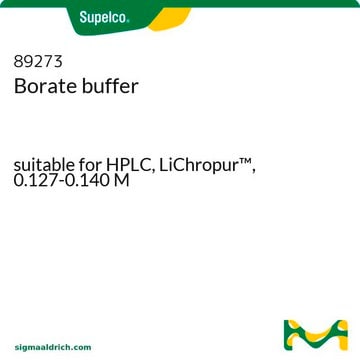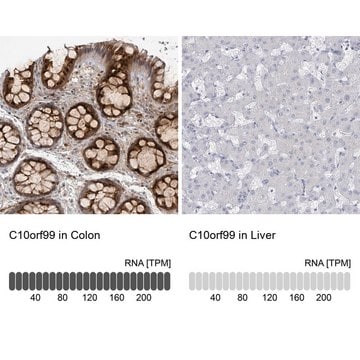P0657
Phthaldialdéhyde
suitable for HPLC fluorimetric detection of amino acids, ≥99% (HPLC), powder or crystals
Synonyme(s) :
Dicarboxaldéhyde o-phtalique, o-Phthalaldéhyde, Benzène-1,2-dicarboxaldéhyde, OPA
About This Item
Produits recommandés
Niveau de qualité
Pureté
≥99% (HPLC)
Forme
powder or crystals
Technique(s)
HPLC: suitable
Couleur
white to light yellow
Pf
55-58 °C
Adéquation
suitable for HPLC fluorimetric detection of amino acids
Température de stockage
2-8°C
Chaîne SMILES
O=Cc1ccccc1C=O
InChI
1S/C8H6O2/c9-5-7-3-1-2-4-8(7)6-10/h1-6H
Clé InChI
ZWLUXSQADUDCSB-UHFFFAOYSA-N
Vous recherchez des produits similaires ? Visite Guide de comparaison des produits
Application
- in the preparation of O-phthaldialdehyde reagent for analysing gentamycin content
- in the preparation of reagent for determining the degree of hydrolysis of milk proteins
- in the measurement of free amino acids of milk samples by O-phthaldialdehyde/N-acetyl-L-cysteine (OPA/NAC) assay
- in the derivatization of putrescine samples
Actions biochimiques/physiologiques
Mention d'avertissement
Danger
Mentions de danger
Classification des risques
Acute Tox. 3 Oral - Aquatic Acute 1 - Aquatic Chronic 1 - Eye Dam. 1 - Skin Corr. 1B - Skin Sens. 1 - STOT SE 3
Organes cibles
Respiratory system
Code de la classe de stockage
6.1A - Combustible acute toxic Cat. 1 and 2 / very toxic hazardous materials
Classe de danger pour l'eau (WGK)
WGK 3
Point d'éclair (°F)
269.6 °F - closed cup
Point d'éclair (°C)
132 °C - closed cup
Équipement de protection individuelle
Eyeshields, Faceshields, Gloves, type P3 (EN 143) respirator cartridges
Faites votre choix parmi les versions les plus récentes :
Déjà en possession de ce produit ?
Retrouvez la documentation relative aux produits que vous avez récemment achetés dans la Bibliothèque de documents.
Les clients ont également consulté
Notre équipe de scientifiques dispose d'une expérience dans tous les secteurs de la recherche, notamment en sciences de la vie, science des matériaux, synthèse chimique, chromatographie, analyse et dans de nombreux autres domaines..
Contacter notre Service technique













